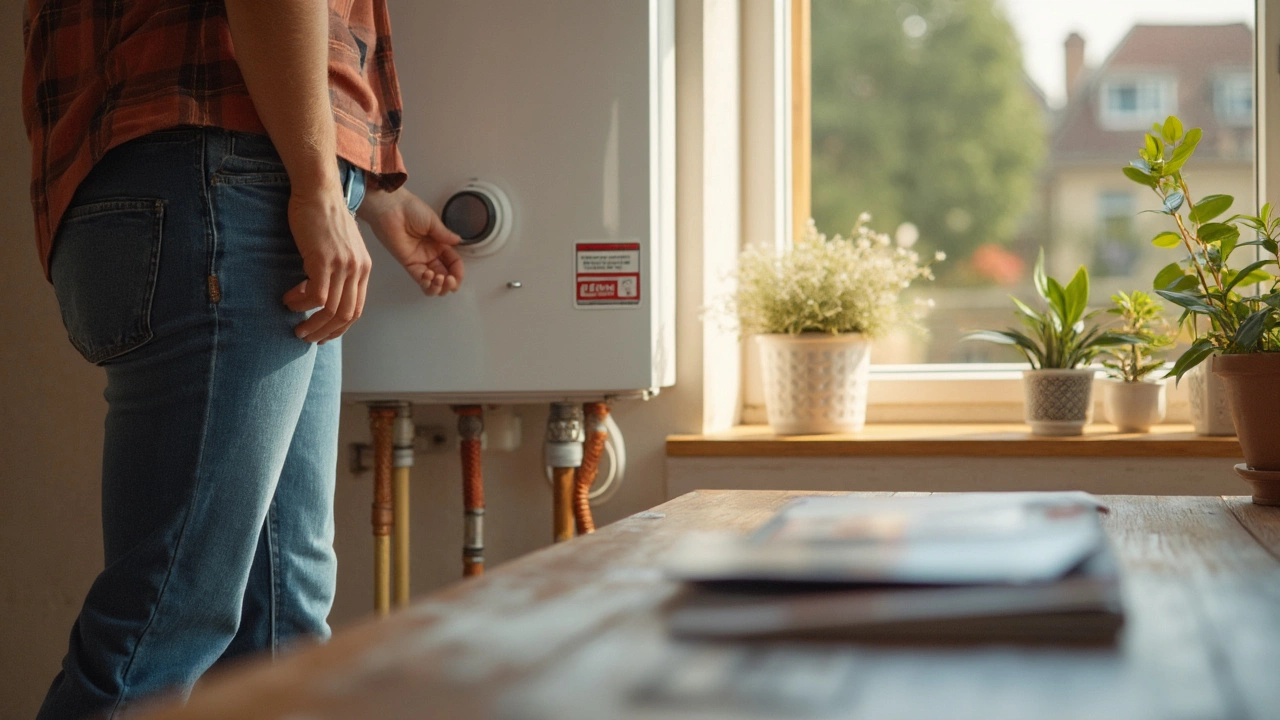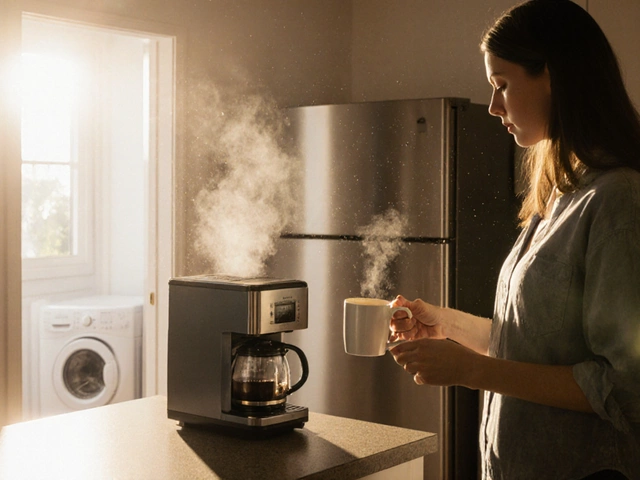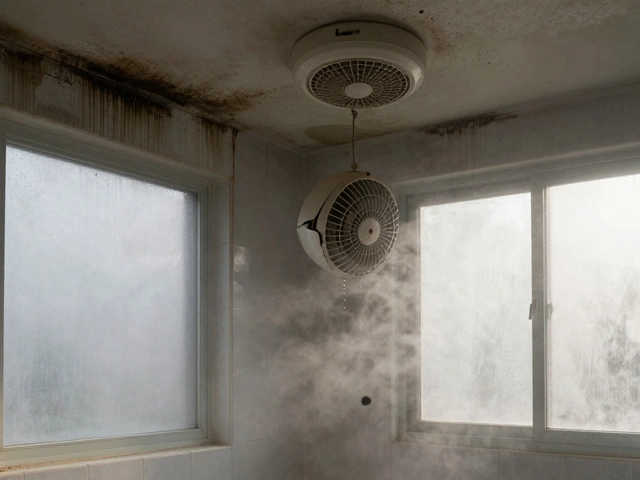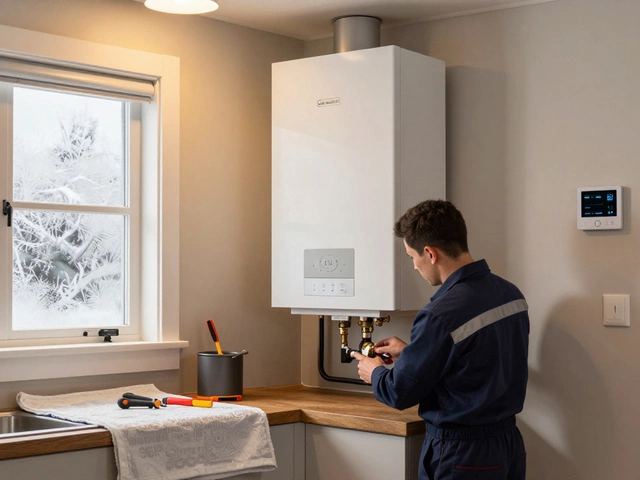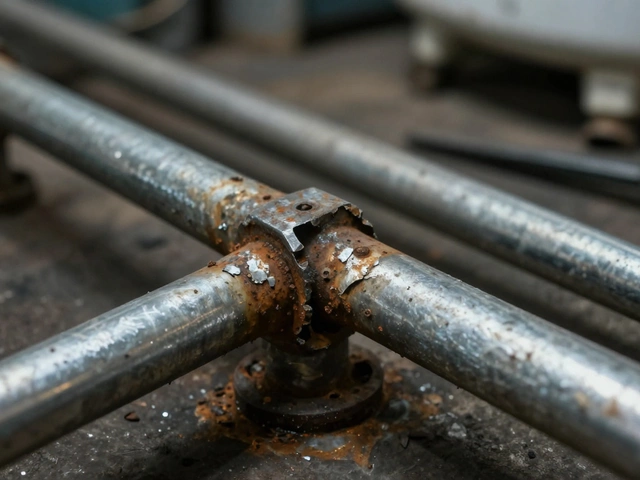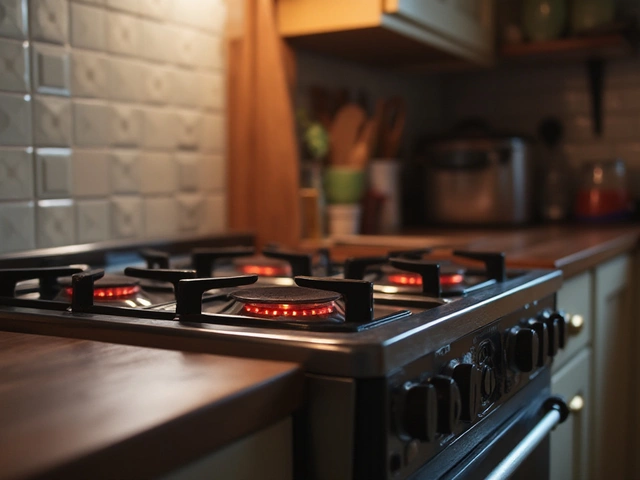The question pops up every autumn—can you actually take care of your own boiler at home? Or are you just asking for a freezing disaster when winter hits? If you’re trying to avoid those sky-high callout fees, you’re not alone. Here’s the thing: boilers are weirdly complicated and, if you mess up, they can cause more trouble than just a cold shower. Some jobs are totally doable, but others are a hard no unless you like the idea of breaking the law or causing a gas leak (spoiler: nobody does).
Start with the basics. You can check your boiler’s pressure, give the outside of the unit a wipe, and maybe bleed your radiators if they’re making weird noises or feel colder at the top. But once you start thinking about taking off panels, poking around with gas or electrics, or resetting scary error codes, that’s where most of us should stop and pick up the phone. That safe line isn’t set by manufacturers just for fun—it’s normally a legal thing, too. If you’re renting, it gets even stricter.
Why care so much? A badly serviced boiler doesn’t just cost more to run. There are real risks—gas leaks, carbon monoxide, you name it. If you get it wrong, you’re not just risking your heating; you’re risking your home and everyone in it. You might think you’re saving a buck, but the costs of fixing a botched job or dealing with an emergency can triple what you’d pay a certified pro. Next up, let’s break down exactly what you can—and can’t—do yourself, and how to keep your boiler ticking over safely.
- What Boiler Servicing Really Means
- What You Can Do Yourself (Safely)
- When You Should Call a Pro
- The Law: What’s Actually Legal?
- Why Boiler Safety Isn’t a Joke
- Tips for Saving Money on Boiler Care
What Boiler Servicing Really Means
When people talk about boiler servicing, it’s not just a quick look-over and wipe-down. Servicing digs into everything that keeps your heating safe, efficient, and working when you actually need it. It’s more than swapping a filter or hitting reset—there are real checks and measurements involved.
Here’s what a real pro checks during a boiler service:
- Gas pressure: Making sure your boiler is burning fuel at the right rate. If it’s off, your boiler can struggle or even become dangerous.
- Leaks: Not just water—gas leaks are a big deal and need spotting early.
- Flue check: Making sure fumes go safely outside and not into your home. Even a tiny issue here means trouble.
- Internal parts: A tech opens up the case and checks out the main burner, heat exchanger, and seals for signs of damage or dirt.
- Controls: Making sure everything starts, stops, and adjusts like it should. A faulty thermostat can spike your bills.
- Safety devices: These trip if something’s wrong—carbon monoxide, overheating, or pressure problems. If they fail, your boiler could become a hazard.
It’s recommended by the UK’s Health and Safety Executive that boilers get serviced every 12 months—not just to avoid breakdowns but to keep your warranty valid. British Gas says around 80% of breakdowns could be prevented with regular servicing. That’s a big percentage, and it explains why pros take this stuff so seriously.
| Task | DIY Friendly? | Needs a Pro? |
|---|---|---|
| Wiping exterior | Yes | No |
| Checking pressure gauge | Yes | No |
| Testing gas pressure | No | Yes |
| Flue check | No | Yes |
| Cleaning burner/heat exchanger | No | Yes |
| Checking safety devices | No | Yes |
If you want your heating to last through winter without drama, real boiler servicing isn’t something to DIY unless you’re legally qualified—and, honestly, most folks aren’t. It keeps you safe, saves you money in the long run, and stops small issues turning into big headaches.
What You Can Do Yourself (Safely)
The big question is: what really counts as a safe DIY job when it comes to your boiler? The good news—there are a handful of things you can take care of without risking your heating system or getting in trouble. Most homeowners can handle simple stuff, but knowing where to stop is key.
The safest and most useful tasks are often about basic checks and light maintenance. Here’s what you can do:
- Check Your Boiler’s Pressure: Most boilers work best between 1 and 1.5 bar. If the pressure drops too low, it could stop heating properly. You can top it up by opening the filling loop valve. Don’t go above 2 bar, though, or you could cause a leak.
- Bleed Radiators: Got cold spots at the top? Use a radiator key to let out trapped air. This helps your system run smoother and heat your home faster.
- Clean the Exterior: Wiping dust and grime from the outside of the unit and vents helps prevent overheating. But don’t remove any boiler covers or panels.
- Test the Thermostat: Make sure your home is reaching the right temperature. Sometimes, just swapping out thermostat batteries can make a big difference.
- Check for Obvious Leaks: Look for water pooling under the boiler. Spot a leak? Time to call for help—don’t try to fix these yourself.
None of these require special tools or training. And, importantly, you’re not opening up the boiler case or touching any gas or electrical parts. That’s where things get dangerous (and illegal for anyone not certified).
| DIY Friendly | Call a Pro |
|---|---|
| Check pressure | Replace parts |
| Bleed radiators | Service gas components |
| Clean exterior | Open boiler casing |
| Test thermostat | Deal with leaks inside the unit |
One real stat: According to the Gas Safe Register 2024 survey, nearly 60% of boiler breakdowns were caused by things homeowners could have spotted (like low pressure or air in radiators). But when it came to actual boiler service, certified engineers found issues most DIYers missed—stuff that could have led to serious failures.
Bottom line: Stick to what’s on this list. You’ll keep your boiler happy, save on emergency callouts, and spare yourself any legal headaches. If in doubt, don’t guess—just get advice from someone who fixes these things for a living.
When You Should Call a Pro
Some things with boilers are just not meant to be DIY. There are clear signs and situations where you’re better off picking up the phone and booking in someone qualified. Not only for your own safety but also because it keeps your home insurance valid. Here’s when you skip the toolkit and let the experts handle it.
- Gas leaks or smells: If you even suspect a gas leak, don’t mess around. Turn off the gas at the main valve, get everyone out, and call the emergency gas line immediately.
- No hot water or heat: If your boiler won’t fire up at all, or if it keeps switching itself off, this points to deeper problems with the ignition or internal circuits that you shouldn’t touch.
- Weird noises: Clanking, banging, or whistling isn’t normal. It could be kettling (caused by limescale buildup) or trapped air, but if radiators are fine and the noises don’t stop, it’s time for a pro.
- Water leaks: Any water around the boiler base or inside the cupboard means trouble. Leaks can ruin electronics and quickly turn a small issue into a flooded room.
- Error codes that won’t clear: While some codes just mean low pressure or need a reset, others could involve faulty sensors or blocked components. Reading and fiddling with these without proper training can make the problem worse.
Why does it matter? UK law sets a hard line for anything involving the gas supply—the person must be Gas Safe registered. In 2024, over 80% of home insurance policies would not pay out if an unqualified person worked on a gas boiler, even if the problem wasn’t directly caused by the repair attempt.
If you want some quick numbers about why it pays to get a pro involved, check this out:
| Cause | DIY Avg. Cost (if it goes wrong) | Pro Avg. Repair Cost |
|---|---|---|
| Gas Leak | £1,200+ (damage repair/legal fees) | £90-£150 |
| Major Water Leak | £600+ (flooring, clean-up) | £120-£200 |
| System Error/Breakdown | £350+ (replacing main board) | £70-£130 |
Bottom line—there’s a strong safety and financial case for getting pros in for more than just the basics. When you spot serious issues, your best move is to call someone trained, registered, and insured. Your boiler, your bank account, and your peace of mind will thank you.
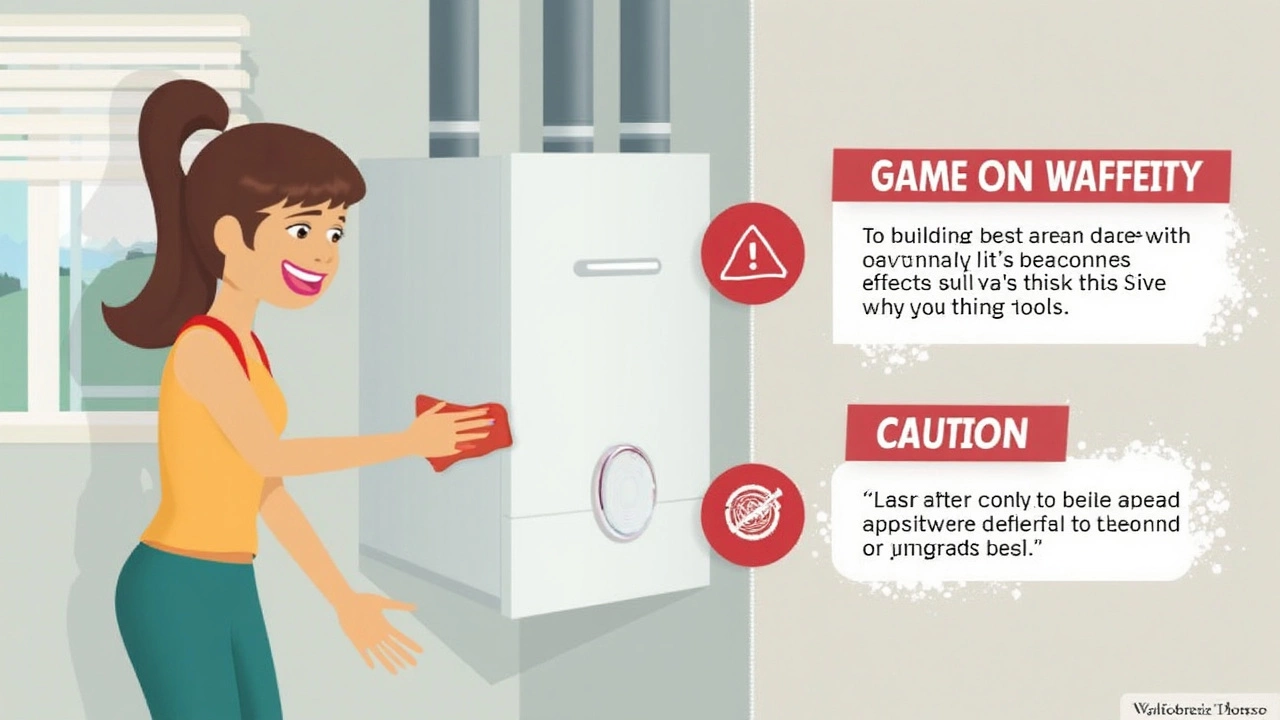
The Law: What’s Actually Legal?
This is where it gets serious. In the UK—and lots of other places, to be honest—the law is crystal clear: you can’t fix most parts of a boiler unless you’re a registered Gas Safe engineer. Sounds strict, but there’s a good reason for that. Messing with gas or certain electrical work without the right license doesn’t just void your home insurance, it’s actually a criminal offense. That means hefty fines if you get caught, and in the worst cases, you could end up in court.
Here’s the short version of what you can do legally:
- Check and top up boiler pressure (without removing the boiler case)
- Bleed radiators
- Clean the outside of your boiler
- Reset the boiler using the official switch or button
What you can’t do includes:
- Open the boiler case or mess with internal parts
- Fix, remove, or install anything to do with the gas supply
- Alter the electrical wiring inside the boiler
- Bypass or reset safety features that are designed to stay on for safety (error codes, for example)
Landlords have it even tougher. If you rent out your place, you have to get an annual Gas Safety Certificate from a Gas Safe engineer. No exceptions—even if you think you know what you’re doing. Insurance companies won’t pay out on claims if they find out you fiddled with anything inside the boiler, licensed or not.
Take a look at how the penalties stack up:
| Offense | Potential Fine | Other Consequences |
|---|---|---|
| Unlicensed boiler repair | Up to £6,000 per offense | Court summons, criminal record |
| No Gas Safety Certificate (for landlords) | Unlimited | Eviction orders, void insurance |
| Causing a gas leak | Unlimited | Prison for serious harm or death |
If you’re feeling bold, remember this: the Gas Safe Register is there for a reason. That yellow triangle badge on your engineer’s card means they’re trained to not blow the house up. So, when it comes to boiler service and anything beyond basic cleaning or pressure topping, play it smart—leave it to the pros. Your wallet (and your nerves) will thank you in the long run.
Why Boiler Safety Isn’t a Joke
If you think skipping boiler safety checks is no big deal, think again. One loose connection can mean a gas leak, or worse, a carbon monoxide leak—which you can't smell or see. The NHS reports over 200 UK hospital admissions a year due to carbon monoxide poisoning, mostly from dodgy boilers or gas appliances. And it's not just about your health or your family's safety. Dangerous *boiler service* attempts can also mess with your insurance or even break the law.
People sometimes say, "Well, it's just heating, how bad can it get?" But here's what can actually happen with poor maintenance or DIY fixes gone wrong:
- Silent carbon monoxide leaks (nicknamed the "silent killer," even by doctors)
- Explosions, usually from gas build-up or blocked vents
- Major water damage from uncontrolled leaks
- Permanent boiler breakdown, leaving you freezing at the worst time
Insurance companies have pretty strict rules on this stuff. If you do unauthorized work and something goes wrong, they might not pay for repairs or damage. Plus, UK law says only Gas Safe registered engineers can take the lid off and mess with the insides of gas boilers. Fines for breaking this law can hit £6,000, and that's not counting a possible trip to court if someone gets hurt.
Here are some numbers just to hammer it home:
| Risk/Event | Annual UK Incidents |
|---|---|
| Carbon monoxide poisonings (hospitalized) | 200+ |
| Reported household gas leaks | ~1,500 |
| Boiler explosions | Rare, but serious when they occur |
The bottom line? Boiler safety isn’t just about being "handy"—it’s about protecting people, not having to move out for repairs, and not risking a fine (or worse). If you suspect a problem—like smelling gas, hearing weird noises, or your carbon monoxide alarm goes off—turn off the boiler, get outside, and call for professional help—no heroics needed.
Tips for Saving Money on Boiler Care
You don’t need a degree in rocket science to keep your heating bills down. Regular upkeep on your boiler can squeeze some extra years out of it and cut costs fast—no magic tricks needed. Start with this: keep your boiler’s pressure in the right range (usually 1 to 1.5 bar when cool) by checking the gauge every couple of months. Low pressure makes your boiler work harder and burn more gas.
Second, bleeding your radiators every autumn is like a reset button for your whole heating system. Air trapped inside stops them heating properly. All you need is a radiator key and a towel. Most folks forget, but it really does make your system run smoother and more efficiently.
Now for the obvious one: don’t skip your annual boiler service. It’s the best way to catch trouble before it gets expensive. Some people hope skipping the annual checkup will save them money this year, but research from boiler manufacturers shows that regular servicing can extend a boiler’s life by several years. And a healthy boiler uses less energy, so your bills drop too.
If you’re handy, you can clean dust off the exterior and around your boiler to boost airflow. Just don’t take the cover off—leave anything inside to the pros. Setting up a smart thermostat is another game-changer. Some, like the Nest or Hive, can cut heating costs by up to 12%, just by learning your habits and stopping energy waste.
- Shop around for service plans. Some companies offer boiler service subscriptions with zero callout fees—handy if you’re worried about breakdowns.
- Only use certified engineers for any job that involves working on the inner parts. That’s not just a rule—it can keep your warranty valid and your insurer happy.
- Use a carbon monoxide alarm near your boiler. It’s a cheap gadget that could save your life and protect you from huge repair bills linked to leaks.
Most important: don’t ignore strange noises, leaks, or weird smells. Waiting just costs you more when it finally gives up. Staying on top of these basic tasks is the easiest way to cut expenses on your boiler service and avoid surprise breakdowns when you least expect them.
